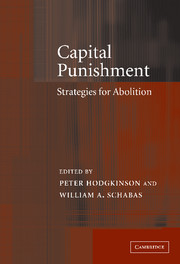Book contents
- Frontmatter
- Contents
- List of figures
- List of tables
- Notes on the contributors
- 1 Capital punishment: improve it or remove it?
- 2 International law and the death penalty: reflecting or promoting change?
- 3 Doctors and the death penalty: ethics and a cruel punishment
- 4 Replacing the death penalty: the vexed issue of alternative sanctions
- 5 Religion and the death penalty in the United States: past and present
- 6 On botched executions
- 7 Death as a penalty in the Shari'ā
- 8 Abolishing the death penalty in the United States: an analysis of institutional obstacles and future prospects
- 9 Capital punishment in the United States: moratorium efforts and other key developments
- 10 The experience of Lithuania's journey to abolition
- 11 The death penalty in South Korea and Japan: ‘Asian values’ and the debate about capital punishment?
- 12 Georgia, former republic of the USSR: managing abolition
- 13 Capital punishment in the Commonwealth Caribbean: colonial inheritance, colonial remedy?
- 14 Public opinion and the death penalty
- 15 Capital punishment: meeting the needs of the families of the homicide victim and the condemned
- Index
14 - Public opinion and the death penalty
Published online by Cambridge University Press: 22 September 2009
- Frontmatter
- Contents
- List of figures
- List of tables
- Notes on the contributors
- 1 Capital punishment: improve it or remove it?
- 2 International law and the death penalty: reflecting or promoting change?
- 3 Doctors and the death penalty: ethics and a cruel punishment
- 4 Replacing the death penalty: the vexed issue of alternative sanctions
- 5 Religion and the death penalty in the United States: past and present
- 6 On botched executions
- 7 Death as a penalty in the Shari'ā
- 8 Abolishing the death penalty in the United States: an analysis of institutional obstacles and future prospects
- 9 Capital punishment in the United States: moratorium efforts and other key developments
- 10 The experience of Lithuania's journey to abolition
- 11 The death penalty in South Korea and Japan: ‘Asian values’ and the debate about capital punishment?
- 12 Georgia, former republic of the USSR: managing abolition
- 13 Capital punishment in the Commonwealth Caribbean: colonial inheritance, colonial remedy?
- 14 Public opinion and the death penalty
- 15 Capital punishment: meeting the needs of the families of the homicide victim and the condemned
- Index
Summary
Public opinion is frequently invoked in defence of capital punishment. Sometimes it presents itself as an excuse, relied upon by legislators and jurists who argue that they are personally favourable to abolition of the death penalty but that they cannot move too far ahead of public opinion. And sometimes it appears as a justification, because use of capital punishment is said to be the consequence of democratic rule: it is the will of the majority. In their recent book, Robert Jay Lifton and Greg Mitchell note that ‘the death penalty exists uneasily in any contemporary democracy. Emerging democratic attitudes, over centuries, mostly militate against state killing.’ And so we have a paradox. Democracy leans towards abolition, but retentionists defend the death penalty in the name of the will of the people. Should human rights need to protect itself from public opinion?
During the April 2001 session of the United Nations Commission on Human Rights, United States Ambassador George Moose said there was public debate on the question in his country, but that ‘[e]ach nation should decide for itself through democratic processes whether its domestic law should permit capital punishment’. The United States, in its initial report to the Human Rights Committee pursuant to Article 40 of the International Covenant on Civil and Political Rights, said that ‘[t]he majority of citizens through their freely elected officials have chosen to retain the death penalty for the most serious crimes, a policy which appears to represent the majority sentiment of the country’.
- Type
- Chapter
- Information
- Capital PunishmentStrategies for Abolition, pp. 309 - 331Publisher: Cambridge University PressPrint publication year: 2004
- 2
- Cited by

